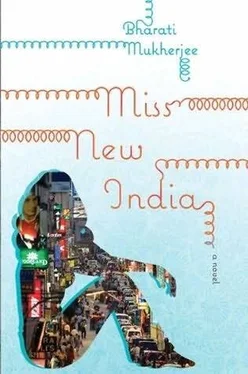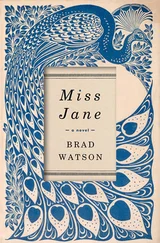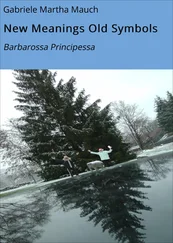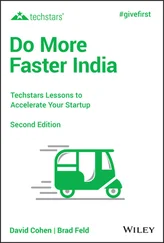"Angie, Angie, don't lie to me."
What was the point of exchanging letters if the sisters couldn't get beyond polite, perfunctory formalities? "All right. If you want to know the truth, she thinks I'm selfish. She doesn't approve of my having left home."
Peter's packed duffel bag and bulging book tote lay on the floor just inside the door, ready for him to carry out to the auto-rickshaw. His multipocketed, handloom cotton vest, convenient for stowing airline tickets and wallet, was laid out at the foot of the bare mattress. She wouldn't allow flashbacks of her quarrel with Sonali-di to beat back fantasies of her future with Mr. GG. She wanted to gush to Peter about love, not family. "How is Ali?" He would want to talk about Ali just as much as she wanted to speak of Mr. GG. She checked his face for an automatic softening. But he stared at her as though she had punched him. She lowered her gaze to his lips, which pursed and parted a couple of times. He seemed on the verge of a profound confession or a disturbing confidence.
"I have very sad, very important news for you," he said. He reached for his vest, extracted a newspaper clipping from the breastpocket sewn into the lining to safeguard cash, and held it out to her. "This is the reason I came.
She recognized a smudged face in the tiny photo in the clipping from The Gauripur Standard: Baba's studio matrimonial portrait. A beadyeyed, mustached young man doing his best to project confidence and purpose. She had seen the original in the family album, which was stored, swaddled in a woolen shawl, in Ma's dowry trunk. Ma was proud of that photo. Anjali and Sonali had caught her taking the album out of the trunk and surreptitiously flipping it open to Baba's studio portrait on several Sunday afternoons while Baba slept off the heavy Sunday lunch of mutton curry. Ma, Anjali realized, was in love with the man she had conjured from that photo, but not with the obsequious Indian Railways bureaucrat her parents had forced her to marry. Ma had nagged Baba constantly. In Gauripur, Anjali had dismissed that nagging as white noise and paid no attention to Ma's words. The Ma who had brought her up must have been a bitter woman. Anjali tried to visualize Ma as a dreamy teenage bride-to-be, swooning over the youthful face in Baba's posed studio portrait. That girl must have prayed hard that she would be selected over rival candidates. Shaky Sengupta was an illusionist, and Anjali now better understood how the art of all the Shaky Senguptas was supposed to work: incite fantasies of permanent prosperity and protection. When disillusionment strikes, get out of range of the victim's vengeful feelings.
And then, click-click. That picture, in that paper. It could mean only one thing. Sonali-di must have selected that photo to send to the Standard. Baba was dead. He must have been cremated within twenty-four hours of his passing. Peter had hurried her away from acid-tongued Husseina so he could deliver his shocking message in private. She turned away from the clipping, which Peter was still holding out to her. She pushed his hand away. As long as she didn't read the obituary, she could pretend he was alive. Baba and Ma could live on, squabbling continuously, which was their version of conjugal togetherness. Peter held out his handkerchief to dry the tears she didn't know she'd shed.
"I can understand your wanting to be with your family at a time like this." Peter sneaked a look at his watch. "I'll take care of your travel arrangements as soon as I get back. If you want to come back here, I can arrange it with Minnie. The Patna-Bangalore return ticket can be left open."
"Patna?"
"Your mother has moved in with your sister. Would you rather I read this," he tapped the clipping, "out loud?"
"No. Just give it to me."
The whole time I've been here, Baba's been dead. I had these dreams, I had moments of forgiveness and moments I wanted to be forgiven. He'd been in my dreams, and now he was a ghost.
She heard a voice, in Bangla: "You killed him." Was it her mother?
"You were too good for that boy. You had to make more money than your father. You had to be your own boss. You never thought what Baba went through at the office. All of Gauripur laughed behind his back, 'There goes Bose-babu, two daughters, one divorced, the other a… a runaway. Went to Mumbai, became a prostitute.' He couldn't take it any longer. He ended his life."
BOSE, PRAFULLA KUMAR. 48, suddenly at his residence in Gauripur. Asst. sub-inspector (Goods), Indian Railways (north Bihar). Third-Generation Gauripur native. Like his father (Dipendu Kumar) and his grandfather (Neelkontho Kumar), Prafulla Kumar joined railway service straightway after obtaining B. Comm. Man of unyielding faith and steadfast integrity, elected Vice-President of the Gauripur Durga Puja Committee for seven consecutive years and was holding that office at his untimely demise. His patrilineal survivors include six brothers, who migrated permanently to Kolkata. He is mourned by his widow Archana Debi, his married daughter Sonali (Das) and granddaughter residing in Patna. He was predeceased by his second daughter. His ashes join cosmic unity. His loss to the Bengali community of Gauripur is immeasurable. We, members of the Durga Puja Committee, mourn his absence with inconsolable hearts and crestfallen minds. Nagendra Nath Bhattacharya, President, Durga Puja Committee.
She had to puzzle out the word predeceased. It was a new English word for her to absorb. You are dead to me! Predeceased suggested a less violent end; her family had pressed the DELETE button and she had vanished into the ether. No corpse, no cremation. They had morphed her into a ghost. Baba was dead, but so was she. She felt dizzy. Her teacher was talking at her, tossing words as if they were life jackets and she was drowning.
"This isn't the time for self-blame," she heard him say. That had to mean that Peter, somehow, blamed her. But she wasn't the one who had done the killing; they had-her father, her mother, her sister. Her father was-had been-"fit as a fiddle" according to the railway doctor, who was also a Bengali and the treasurer of the Durga Puja Committee. The doctor, stethoscope around his neck, would drop by the Bose flat two or three evenings a month, enjoy a whiskey and her mother's deep-fried savories, listen to her father's heart, and pronounce him "fit as a fiddle."
"If you're wondering, it wasn't from a heart attack," said Peter. "But that's the story they're putting out."
What was he saying?
He died "suddenly"; that can only mean a heart attack, a stroke, something to do with high blood pressure. All Indian men suffered from high blood pressure. Salty food, smoking-it was a known flaw.
"I am taking up too much of your time. You'll be late for your flight," she said. For all his empathy for Gauripur students, Peter didn't understand their family problems, especially not hers. She'd grown up with chaos masquerading as coherence. Fear, not steadfastness, had kept her father in dead-end Gauripur. Fear had forced him to follow his father's and his grandfather's footsteps into the railway office of Gauripur. She was an ungrateful, unworthy daughter; she accepted that. She was selfish and recklessly impatient. In fact, she embraced her flaws. Confessing unworthiness delivered a newfound freedom.
Her family had orphaned her. She had not even any pretense of a home back in Gauripur. The Bose flat would already be occupied by another tenant. Ma must have been taken in by Sonali-di. A month ago Sonali-di had been the disgraced, divorced daughter; now Sonali-di was the good, dependable one. She pictured her mother in Sonali-di's drab apartment, fussing over her granddaughter, cooking, cleaning, and faking middle-class respectability while Sonali-di did for her boss whatever he demanded so she wouldn't lose her job. "You have more to go back to in Gauripur than I do." She rose from the armchair, not sure if a good-bye hug was appropriate.
Читать дальше












